
Mathis James Reed was an American blues musician and songwriter. His particular style of electric blues was popular with a wide variety of audiences. Reed's songs such as "Honest I Do" (1957), "Baby What You Want Me to Do" (1960), "Big Boss Man" (1961), and "Bright Lights, Big City" (1961) appeared on both Billboard magazine's R&B and Hot 100 singles charts.

Five Live Yardbirds is the live debut album by the English rock band the Yardbirds. It features the group's interpretations of ten American blues and rhythm and blues songs, including their most popular live number, Howlin' Wolf's "Smokestack Lightning". The album contains some of the earliest recordings with guitarist Eric Clapton.

Having a Rave Up with the Yardbirds, or simply Having a Rave Up, is the second American album by the English rock group the Yardbirds. It was released in November 1965, eight months after Jeff Beck replaced Eric Clapton on guitar. It includes songs with both guitarists and reflects the group's blues rock roots and their early experimentations with psychedelic and hard rock. The title refers to the driving "rave up" arrangement the band used in several of their songs.

William Larry Stewart II was an American R&B singer and pianist popular during the 1960s.

"Shapes of Things" is a song by the English rock group the Yardbirds. With its Eastern-sounding, feedback-laden guitar solo and environmentalist, antiwar lyrics, several music writers have identified it as the first popular psychedelic rock song. It is built on musical elements contributed by several group members in three different recording studios in the US, and was the first Yardbirds composition to become a chart hit; when released as a single on 25 February 1966, the song reached number three in the UK and number eleven in the US.
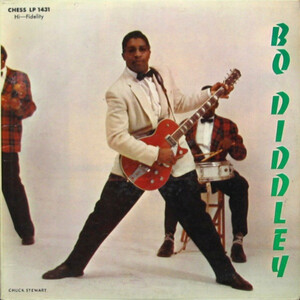
Bo Diddley is the debut album by American rock and roll musician Bo Diddley. It collects several of his most influential and enduring songs, which were released as singles between 1955 and 1958. Chess Records issued the album in 1958. In 2012, it was ranked number 216 on Rolling Stone's 500 Greatest Albums of All Time list alongside his second album, Go Bo Diddley (1959). The ranking of the album pair dropped to number 455 in the 2020 update of the list.
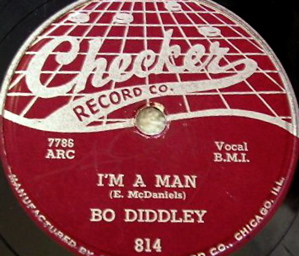
"I'm a Man" is a rhythm and blues song written and recorded by Bo Diddley in 1955. Inspired by an earlier blues song, it was one of his first hits. "I'm a Man" has been recorded by a variety of artists, including the Yardbirds, who adapted it in an upbeat rock style.

"Bo Diddley" is a song by American rock and roll pioneer Bo Diddley. It introduced the rhythm that became known as the Bo Diddley beat and topped the Billboard R&B chart for two weeks in 1955. The song is included on many of Diddley's compilation albums including Bo Diddley (1958) and His Best (1997). Buddy Holly recorded a version that became his highest-charting single in the UK.

Sonny Boy Williamson & the Yardbirds is a live album by Chicago blues veteran Sonny Boy Williamson II backed by English rock band the Yardbirds. It was recorded at the Crawdaddy Club in Richmond, Surrey on December 8, 1963. However, the performances were not released until early 1966, after a string of Top 40 hits by the Yardbirds.

"Evil Hearted You" is a 1965 song by the English rock group the Yardbirds. It was written by future 10cc member Graham Gouldman, who also wrote the group's two prior singles, "For Your Love" and "Heart Full of Soul". It reached No. 3 on the main UK singles chart.

William "Billy Boy" Arnold is an American blues harmonica player, singer and songwriter. Arnold is a self-taught harmonica player and has worked with blues legends such as Bo Diddley, Johnny Shines, Otis Rush, Earl Hooker, Howlin' Wolf, Muddy Waters and others.
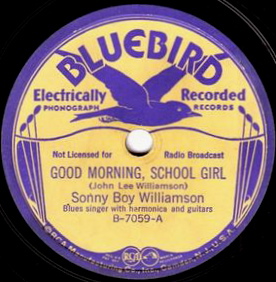
"Good Morning, School Girl" is a blues standard that has been identified as an influential part of the blues canon. Pre-war Chicago blues vocalist and harmonica pioneer John Lee "Sonny Boy" Williamson first recorded it in 1937. Subsequently, a variety of artists have recorded versions of the song, usually calling it "Good Morning Little Schoolgirl".
Joseph Leon "Jody" Williams was an American blues guitarist and singer. His singular guitar playing, marked by flamboyant string-bending, imaginative chord voicings and a distinctive tone, was influential in the Chicago blues scene of the 1950s.
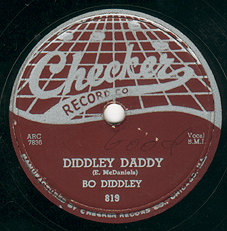
"Diddley Daddy" is a song by Bo Diddley. The song was issued as a single on Checker Records in June 1955. His second single, it followed on the heels of the success of the eponymous "Bo Diddley." The song spent four weeks on the Billboard R&B chart in the summer of 1955, peaking at No. 11.
Calvin Tollie Carter was an American record producer, record label manager and songwriter of jazz and pop songs.

His Best is a 1997 greatest hits compilation album by American rock and roll icon Bo Diddley released by Chess and MCA Records on April 8, 1997. The album was re-released by Geffen Records on April 17, 2007 as The Definitive Collection with a different album cover. The Definitive Collection reached #2 on Billboard magazine's Blues Albums chart on June 21, 2008, which was the week that the album debuted on the charts.

"You Don't Love Me" is a rhythm and blues-influenced blues song recorded by American musician Willie Cobbs in 1960. Adapted from Bo Diddley's 1955 song "She's Fine She's Mine", it is Cobbs' best-known song and features a guitar figure and melody that has appealed to musicians in several genres.
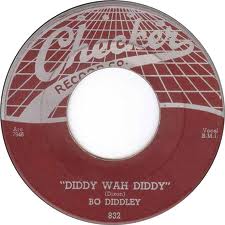
"Diddy Wah Diddy" is a song written by Willie Dixon and Ellas McDaniel, known as Bo Diddley, and recorded by the latter in 1956. The song shares only its title with Blind Blake's song "Diddie Wah Diddie" recorded in 1929. Over the years, the Bo Diddley song has been covered by many bands and artists, including the Astronauts, Captain Beefheart and his Magic Band, the Remains, the Twilights, Taj Mahal, the Sonics, the Fabulous Thunderbirds, Ty Segall Band, and the Blues Band among others.

The Yardbirds are an English rock band, formed in London in 1963. The band started the careers of three of rock's most famous guitarists: Eric Clapton (1963–1965), Jeff Beck (1965–1966) and Jimmy Page (1966–1968), all of whom ranked in the top five of Rolling Stone magazine's list of 100 greatest guitarists. The band's other members during 1963–1968 were vocalist/harmonica player Keith Relf, drummer Jim McCarty, rhythm guitarist Chris Dreja, and bassist Paul Samwell-Smith, with Dreja switching to bass when Samwell-Smith departed in 1966. The band had a string of hits throughout the mid-1960s, including "For Your Love", "Heart Full of Soul", "Shapes of Things", and "Over Under Sideways Down".
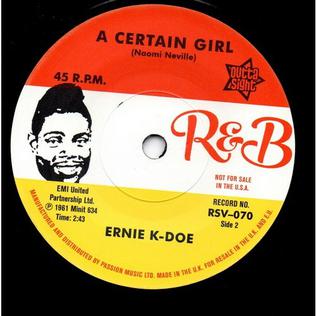
"A Certain Girl" is a rhythm and blues song written by Allen Toussaint, with the credit listed under his pen name Naomi Neville. New Orleans R&B singer Ernie K-Doe recorded it in 1961. Minit Records released the song as the B-side of "I Cried My Last Tear".


















